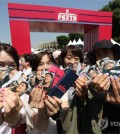- California Assembly OKs highest minimum wage in nation
- S. Korea unveils first graphic cigarette warnings
- US joins with South Korea, Japan in bid to deter North Korea
- LPGA golfer Chun In-gee finally back in action
- S. Korea won’t be top seed in final World Cup qualification round
- US men’s soccer misses 2nd straight Olympics
- US back on track in qualifying with 4-0 win over Guatemala
- High-intensity workout injuries spawn cottage industry
- CDC expands range of Zika mosquitoes into parts of Northeast
- Who knew? ‘The Walking Dead’ is helping families connect
LA pastor helps young Korean Americans fight drug addiction
LOS ANGELES (AP) — In a blue-and-white church on the outskirts of Los Angeles’ Koreatown, pastor Young Ho Han is trying to lift the veil on a problem silently afflicting his community: drug abuse among young Korean Americans.
It’s an issue Han knows well, starting with his own addiction to cocaine after immigrating to Los Angeles in the 1970s to the increasingly young U.S.-born Koreans whose parents discreetly approach him today.
There is the girl whose friends abandoned her in a trash bin after one ruinous binge. The high school debate champion who got addicted to meth within a month of trying pot. The college graduate whose boyfriend persuaded her to try heroin.
Some parents are so fearful their family’s secret will be discovered they park two blocks away.
“They hide it,” said Han, 59. “There’s no talking about drugs.”
Among all Asian groups, Koreans have some of the highest rates of illicit drug use – 12.9 percent reported illegally using a narcotic within the last year, according to data from the U.S. Department of Health and Human Services. The nationwide rate is 14.9.
For years, studies lumped all Asians into one category, giving the impression drug abuse was by and large not a problem. But increasingly, health officials and advocates are pointing toward the need to evaluate individual subgroups and take a culturally-mindful approach to treatment.
They point to data showing Asian Americans with a drug addiction are among the least likely to enter treatment. One study by University of Colorado researchers found Asian Americans suffering from substance abuse were about half as likely as their white counterparts to get treatment.
“The Asian culture is not a culture driven by telling people what’s going on behind closed doors,” said Timothy Fong, a psychiatry professor at the University of California, Los Angeles. “You don’t say, `Look at my problems and help me.’”
In Los Angeles, home to the largest U.S. Asian population, substance abuse treatment is sometimes offered under the guise of spiritual retreats or acupuncture clinics. Those who have tried more direct outreach on drug prevention and treatment say they frequently encounter resistance or denial.
The Asian American Drug Abuse Program, created specifically to address addiction in the community, struggles to fill beds in its residential treatment program with Asian Americans. Nearly half of inpatient clients are black or Latino. Less than a quarter are Asian and the remainder white.
“We’re the minority myth that they talk about,” said Dean Nakanishi, administrative director for AADAP. “That we don’t have problems and we’re always doing well and we always excel and we don’t have those kinds of issues.”
There have been no large-scale studies examining why Korean Americans have higher drug abuse rates, but Han and others point to myriad factors. The clients Han sees often feel a profound disconnect with their parents and turn to drugs as both an escape and a way to fit in, he said.
“They’re not Korean and they’re not American,” he said. “No identity.”
In the mid-1990s, Han had hit rock bottom: Three failed stints in rehab and a penchant for trying any drug he could get his hands on. Feeling worthless, Han decided to try and kill himself. He drank a cup of hydrochloric acid and fell asleep.
“As soon as I opened my eyes I prayed to God,” Han said, his voice growing quiet at the memory. “I have one prayer request: I don’t want to do drugs.”
He quit cold turkey, trained to become a pastor and opened a small church in 1996 offering Koreans with drug addictions a free place to stay and a regimented program built around morning hikes, prayer and counseling.
Unlike other rehabs, when a resident relapsed, he’d let them come back. He also is outspoken about his church’s mission.
“We are not proud but we don’t hide it,” said Han, now a married father of four.
At night, Han gets upward of 50 calls from parents inquiring about help for their children. At one point, there were more than 100 people living in the building. Most who arrive at his doorstep are 20-something Koreans born in the U.S. and struggling with issues that reach far beyond addiction.
In the clinical world, Han’s approach would likely be considered controversial: Letting addicts who relapse return and relying on a primarily faith-based approach are not considered standard practices.
“A lot of people argue faith is no good, it’s brain-washing,” Fong said. “But at the same time, if it means somebody is coming back and they’re restoring meaningful connections … I don’t care what you call it.”
Inhui Bak, 48, a hairdresser in Los Angeles, heard about Han’s church through a co-worker’s aunt. Her son, Daniel Bak, 22, had overdosed three times.
“I knew he had a problem, but I can’t say it,” Inhui Bak said. “All the Korean mommies or daddies, they don’t want to say it.”
In many regards, Bak’s son had been a model teen. He got into an exclusive high school and earned near perfect scores on his SATs. But he said he struggled with the pressure and never felt like he belonged.
After four years of addiction, he moved into Han’s church in February. Daniel Bak is learning Korean, meditating and says he’s hasn’t been so clean since he was 18. A month ago, however, he hopped over the gate and wound up shooting heroin on Skid Row.
“I don’t like getting high,” he said. “I hate the person I become.”
Inhui Bak isn’t trying to hide her son’s problems anymore. When customers at the hair salon ask if she has children she says she has a son in rehab. She’s not ashamed because he’s trying.
“There’s no guarantee,” she said. “But I can wait.”

















Pingback: Free Alcohol Rehab Colorado Springs | W3A.INFO
Pingback: Free Drug Rehab | insurance info
Pingback: Drugs Addiction | insurance info
Pingback: Asian American Substance Abuse Treatment | private - addiction counseling